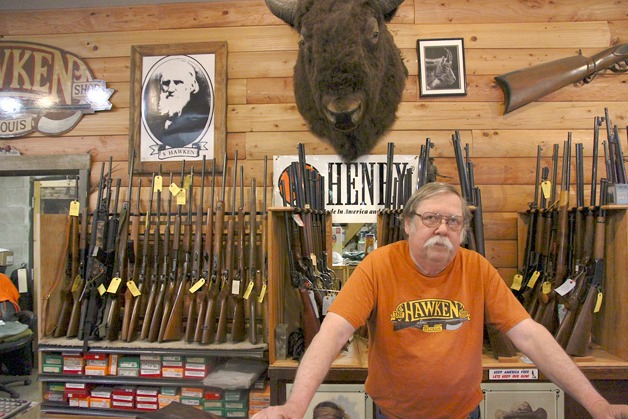The old-time Western-style facade of Greene’s Gunshop on North Whidbey hints at what lies within: a dark wood-paneled, homey-feeling tribute to history. Sure, you can find some modern-day rifles and handguns at Greene’s, and there’s a pistol range out back. But the emphasis is firmly on the past.
“We’ve gone backwards into the old school,” said Claudette Greene, daughter of founders Richard and Jackie Greene, during a recent visit. “We’re not into the modern stuff. We do a lot of black powder.”
“We’re more into muzzle-loaders and cowboy guns.”
Nudging aside one of the four dogs that lounge behind the counters, she pulled two wooden rifles off a rack. Both had tiger maple stocks, massive octagonal iron barrels and percussion-cap firing mechanisms. They fire .54-caliber balls roughly a half-inch in diameter, have all-iron fittings (no reflective brass to give away your position), use black powder as a propellant and weigh a hefty 10-1/2 pounds. They can kill a buffalo at 200 yards.
“These are handmade Hawken rifles, historically correct,” Greene said. “They’re basically what mountain men would carry -— people like Jim Bridger and Kit Carson. But maybe only after they retired, because they were expensive.”
Popular in the 1830s through 1860s, the muzzle-loaders cost $25 to $32 back then. The modern versions Green was showing off sell for $2,600 to $3,200.
Mind you, these are not just any Hawken rifles. Several makers turn out rifles by that name, but only one — The Hawken Shop, which operates alongside Greene’s Gunshop — is a direct descendant of the business started in the early 1800s by St. Louis gunmakers Jake and Sam Hawken, said store manager Greg Roberts. He and Claudette own and run The Hawken Shop, manufacturing the rifles four days a week and running the gun shop the other three.
After the Hawken brothers died, a St. Louis businessman continued making the rifles they had pioneered, using their original tools and machinery, until he closed his shop in 1915. The gear lay unused for more than 50 years until an enthusiast bought it in the early 1960s and started up production, making 300 guns before he, too, closed his doors in the early 1980s.
Greene and Roberts bought the business in December 1990, and now turn out a maximum of five rifles per month. They are built from scratch, by hand, with no outside help. The guns are usable for hunting, but “we sell them more for the history than the function,” Roberts said. “Samuel Hawken was a real guy who did real things. There’s still a mystique around the fur trade, the mountain men — these were some of the toughest men in American history. They didn’t have cell phones to call for help.”
The recent remake of “The Revenant” has produced an uptick in the cyclical interest in old guns, Roberts said, lamenting the generally poor understanding of American history common today. “I can tell where in the country ‘Jeremiah Johnson’ has been on TV lately, because that’s where we get calls from the next day,” he said. Most of his Hawken sales come over the Internet.
Greene’s also sells muzzle-loading revolvers, replicas of pistols used by cowboys and during the Civil War. Some of them sell for $200 to $300.
It carries a large line of modern lever-action Henry rifles, ranging from $300 to $2,600, and a large assortment of accessories, especially catering to muzzle-loaders. One case shows off Claudette’s scrimshaw, which she creates by etching fine designs onto cow horns with a needle. She’s a trained engraver who also helps do old-fashioned hot bluing and refinishing.
The late Richard Greene, eldest of 13 children from a sharecropping family, founded Greene’s Gunshop in 1960 after having retired from the Navy. His widow, Jackie, still works behind the counter.
Last year’s revenues were about $250,000, Roberts said, and “we have diversified enough so that we can make a living. Not make a killing. Make a living.” If Richard Greene hadn’t bought the 36 acres surrounding the store for $2,000 in 1948 and built up the business over the years, “this wouldn’t be sustainable.”
Greene’s Gunshop, at 4778 Monkey Hill Road, Oak Harbor is open Thursday through Saturday, 10 a.m. to 5 p.m. Phone number is 360-675-3421.



